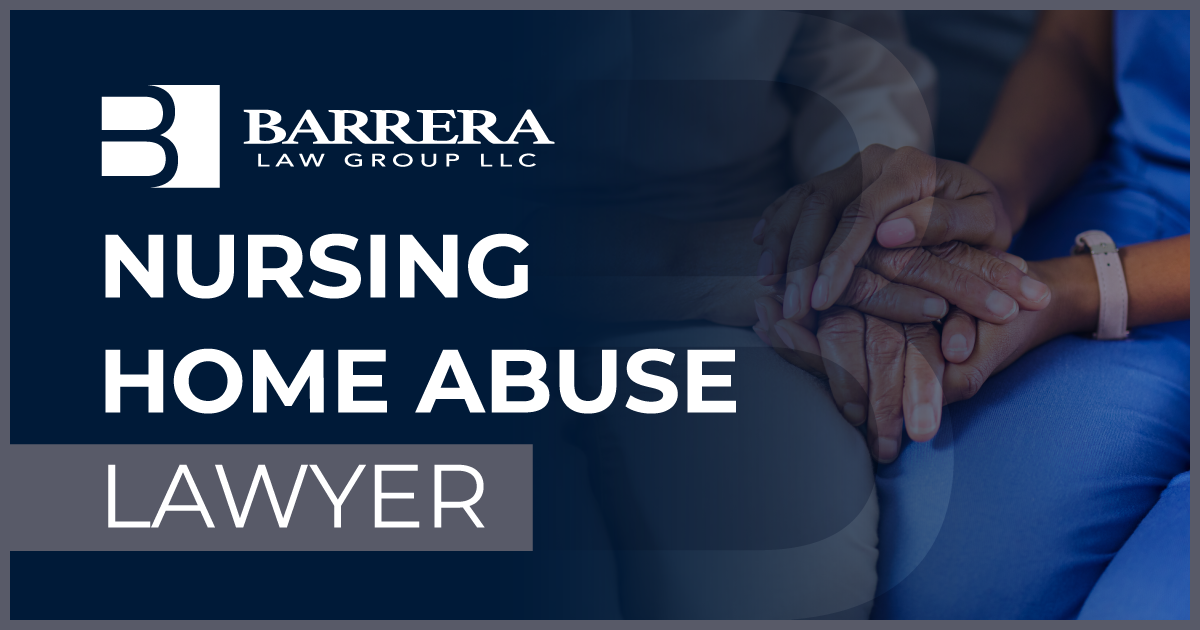Houston Nursing Home Abuse Attorney
A recent KXAN Investigates news report stated that at the beginning of 2022, at least 60 assisted living facilities in Texas would be shut down due to allegations of unsanitary conditions and abuse. While that number may sound small considering how many facilities like these exist in our state, the abusive treatment that got these facilities shut down is far more common than you may think.
Each Houston nursing home abuse lawyer in our office routinely handles cases in which residents have suffered ill-treatment that no one should ever have to endure. We strive to defend the victims’ rights because they deserve justice, and we want to ensure that no one else has to go through similar experiences in the future.
So, if you have been hurt or harmed at an assisted living facility, we can sit down and discuss what happened during a free initial consultation with you. Call us to schedule that meeting with a member of our legal team at Barerra Law Group, LLC now.
Abusive Treatment That Occurs in Nursing Homes
There are many different types of treatment that, in nursing homes, may constitute abusive behaviors, including:
- Physical abuse: This can include hitting, slapping, grabbing, pinching or any other similar violence.
- Emotional or psychological abuse: Yelling at, socially isolating, or belittling residents are just a few examples of emotionally abusive treatments that fit into this category.
- Sexual abuse: This includes any unwanted sexual activity, including anything from inappropriate touching to intercourse.
- Financial exploitation: This may include stealing checks, using a resident’s debit or credit card number to make unauthorized purchases, or procuring an elderly person’s Social Security Number and securing a line of credit with it without their consent (Identity theft).
Additionally, the use of chemical or physical restraints may be indicative of abuse. Over-medicating patients to calm or sedate them is one example of a chemical restraint.
How Texas Long-Term Care Facilities Neglect Residents
Neglectful treatment that frequently occurs in these assisted living facilities, and results in harm to residents can include:
- Malnutrition and dehydration: The deprivation of food and water from residents or the provision of nutritionally imbalanced food to them
- Restricting visitors: Limiting who can see residents, such as friends and family members
- Maintaining unsanitary conditions: A lack of cleanliness in one’s room, restrooms, common areas, and also forcing an individual to wear soiled clothing or sleep on dirty bed linens
- Ignoring calls for help: Patients who are unsteady on their feet and are considered fall risks may attempt to move about on their own if their calls for assistance go unanswered or responses are significantly delayed
- Failing to regularly move patients: Pressure injuries, more commonly known as bedsores, may develop if bedridden or wheelchair-bound residents aren’t regularly moved or shifted, which can result in infections, causing lasting impairments or death
- Restricting medical care: Patients may not receive regularly scheduled checkups or receive medications as prescribed or timely care when ill
- Failing to protect from safety hazards: Staff members who neglect or fail to assist residents, knowing they can’t take care of themselves or escape harm. This can be anything from fires, floods, or extreme weather situations
How To Tell If Your Loved One Has Suffered Abuse or Neglect
When it comes to discovering nursing home abuse, you could face a few barriers as you try to uncover the truth. Unfortunately, many residents may fear retaliation from staff members if they speak up. Some staff or even other residents may have threatened or intimidated them to prevent any disclosure of the abuse.
Residents might also feel ashamed about their situation or believe they’re somehow at fault. Those who have a lack of social connection or are in cognitive decline are most at risk.
How can you tell if a loved one is suffering from an abusive environment in a nursing home? You will want to pay attention to non-verbal cues. If there are any changes in behavior, withdrawal, or sudden anxiety, that could indicate hidden abuse.
However, many times, there are outward physical signs that these vulnerable residents have suffered due to the actions of others. These signs may include:
- Unexplained bruises, cuts, sores, or fractures
- Sudden weight loss or malnutrition
- Unexplained illness, such as sexually transmitted diseases
- Unexplained withdrawals from the resident’s financial accounts
These perpetrators often hide in the shadows, hoping their crimes go undiscovered. As a family member, your vigilance matters. If you suspect abuse, consider reaching out to a Houston nursing home abuse lawyer in our office.
Commons Reasons Nursing Home Residents Are Abused or Neglected
A lot of research has gone into identifying the reasons why caregivers and others inflict abuse or neglect individuals living in assisted living facilities. Although it’s never acceptable to treat someone this way, researchers have found that this ill-treatment most commonly occurs for staff-related reasons, such as:
- Inadequate hiring practices: Improperly performed background checks on new hires, including insufficient review of their prior training and failure to contact references can lead to issues down the road
- Inadequate training: Many employers throw their employees into “the deep end of the pool,” where they must handle potentially dangerous situations, without first ensuring that they have adequate knowledge or experience to do so. In many cases, those workers are afraid to speak up and say that they don’t feel competent to carry out the specified task.
- Understaffing: Texas Administrative Code 554.1002 spells out the minimum staff-to-patient ratios that facilities must maintain. For example, 1 licensed nurse per 20 residents. Even though these ratios exist, they’re really just guidelines. Depending on the needs of their wards, it may be necessary to have fewer residents assigned to a single employee. Otherwise, it may motivate employees to cut corners and not render adequate attention to those under their care.
- Limited supervision: Workers may not perform some of their duties, or carry them out as thoroughly as they should, if they have reason to believe that they’re not being monitored by a surveillance camera, or that no one is checking their patient notes or otherwise performing any oversight of what they do. This leads employees to be less attentive to residents as they should be.
Potential Responsible Parties in Assisted Living Facility Abuse Cases
We often find that victims and their family members only believe that they’re eligible to file suit against a specific person, like a nursing facility staff member, who harmed them.
That’s not necessarily the case, though. If that individual is a direct employee of the residential home, then they’re likely covered under the facility’s insurance policy. So, you can name both the negligent caregiver and their employer when drafting your legal action.
However, it should be noted that direct caregivers aren’t the only staff members who can be responsible for the harm residents suffer. The following, and others, can be as well:
- Cooks
- Maintenance workers
- Cleaning crews
- Program coordinators
- Administrators
It’s also possible for third parties, such as the following, to be held civilly liable for adverse events that they’re responsible for:
- Mail or package carriers or delivery truck drivers
- Physical or respiratory therapists, doctors, and other medical professionals not directly employed by the nursing home
- Other residents or their friends and family members
You can expect your nursing home abuse lawyer to identify and hold liable parties responsible for what happened to you or your loved one.
How an Attorney Can Help in Abuse Cases Like Yours
It can be unnerving to lodge a complaint against a nursing home for their alleged mistreatment of your loved ones, especially when they’re still living in the facility and perhaps are under the same staff members’ care.
That’s why, unless you’re calling 911 to report a life-threatening issue, we encourage you to speak with a Houston nursing home abuse lawyer before anyone else, to first learn your legal options. However, doing this can affect the outcome of your case. How?
Because the strongest claims are the ones where evidence of liability is clear. If you give any heads-up that you’re planning to take legal action, you run the risk of negligent parties discussing facts and concocting false narratives about what happened.
You also risk critical evidence being destroyed, including personnel records, surveillance camera footage, unsanitary conditions, etc. Most importantly, alerting the staff or facility to potential legal proceedings may put a target on your loved one, potentially leaving them vulnerable to being further abused or even killed.
So, let’s discuss your, your family member’s, or your friend’s case now.
It could be the difference between whether your loved one lives the rest of their life as comfortably as possible, or whether they die prematurely from preventable abuse and neglect.
Your initial meeting with a Houston nursing home abuse lawyer from our firm is completely free. So, don’t wait. Contact us at Barrera Law Group LLC to discuss options available to you in your case now.








